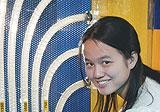$6m funding strengthens UNSW research capacity
UNSW has received $6m as part of a $15m NSW Government funding package that aims to advance Australia's research priorities and build new world-class research facilities.
UNSW has received $6m as part of a $15m NSW Government funding package that aims to advance Australia's research priorities and build new world-class research facilities.

UNSW has received $6m as part of a $15m NSW Government funding package that aims to advance Australia's research priorities and build new world-class research facilities.
Announced by the NSW Minister for Science and Medical Research, Ms Verity Firth, the $15m in funding is shared among 17 new or expanded research facilities based at six NSW universities. The $6m in new funding to UNSW will be used as follows:
$2m to extend and re-tool UNSW's Semiconductor Nanofabrication Facility. The funds will see the SNF accommodate the NSW Node of the Australian National Fabrication Facility (ANFF) and deliver a new high-resolution electron beam lithography system capable of producing nano-scale semiconductor devices as small as 10nm.
$2m to acquire a suite of high-resolution scanning electron microscopes, including a field emission microprobe and an aberration corrected scanning electron microscope. "These instruments will provide high sensitivity and high precision crystallographic, chemical and structural data on a wide range of materials, including device materials, coals, catalysts and advanced alloys," says Professor Paul Munroe, Director of UNSW's Electron Microscope Unit.
$500,000 to advance the research capability of the Bioanalytical Mass Spectrometry Facility. Responding to the announcement, the Director of the BMSF, Dr Michael Guilhaus said: "This is wonderful recognition for the excellent work done by UNSW and the team at the BMSF to grow a world-class mass spectrometry facility." The new funding will help UNSW attract and retain the best minds to our facility help us to work with top research teams in medicine and life science to continue to make breakthroughs that can spin-off important health and economic benefits to NSW and Australia.
$500,000 to support a Recombinant Proteins Facility that UNSW senior lecturer Dr Chris Marquis says will provide a resource for the NSW and Australian research communities to produce proteins and antibodies for research and development. "Recombinant proteins and antibodies are of great significance to biological and biomedical research, drug discovery and also form the basis of many new medical therapies."
$500,000 to support researchers at the Systems Biology Centre who are using mathematical approaches to study biological problems. Because most diseases occur due to subtle simultaneous changes in a number of parts of the cell, rather than big single changes, it is essential to be able to understand the cell's interconnectedness and complexities. To meet the challenge, UNSW is building and extending facilities and research capability where mathematicians, computer scientists, geneticists and biologist are fostering a common conceptual framework to describe the nature of living systems.
$300,000 to support novel pilot-scale biofuel production facilities that convert microalgae into biodiesel for use in internal combustion engines. The state grant supports $7.72m in NCRIS funding for biofuels, of which UNSW has funds allocated of $600,000 from the Federal Department of Education, Science and Training, and $200,000 from UNSW over a five-year period.
$200,000 to improve the capacity of UNSW researchers investigating the regulation and expression of genes across the genome of plants and animals. "Advances in genomics and proteomics are revolutionising the scientific understanding of the molecular mechanisms of disease," said Professor Ian Dawes, Director of the Clive and Vera Ramaciotti Centre. "These new funds will help us provide a better service to the community and assist the development of breakthrough healthcare products by revealing thousands of new biological targets for the development of drugs and vaccines."
Media enquiries: Dan Gaffney, 0411 156 015